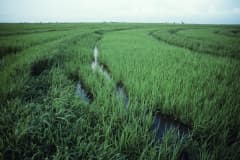Texas Drought Sparks Water Woes and Innovation
They got a little rain in Southeast Texas this week, but hardly enough to provide relief for rice farmers who are grappling with a third year of drought conditions and water constraints.
 "I am very concerned about the long-term viability of our rice industry," rice farmer Ron Gertson said.
"I am very concerned about the long-term viability of our rice industry," rice farmer Ron Gertson said.
According to Gertson, the industry contributes more than $1 billion annually to the state economy, and supports more than 3,000 jobs in east Texas. But, they are being left high and dry by water officials.
Water levels are at a twenty year low, and officials have given priority to maintaining supply for municipal use and power generation, over irrigation needs. This marks the second year rice farmers are being denied access to water from state reservoirs upstream on the Colorado River.
(Read More: Farmers 'Nervous' Over This Year's Crop Season)
"Our farms will survive this year," said Gertson. He has drilled new wells and found enough ground water to cover over half his fields. Crop loss insurance will make up some of the losses, but he noted insurers won't cover drought losses after this year.
Even without the drought, population growth in Texas is projected to leave the state in need of more water resources and conservation in the next twenty years. With 90 percent of the state experiencing very dry or drought conditions now, if it's another dry summer Texas state climatologist John Neilsen-Gammon expects water officials will have to get tough on restrictions well beyond irrigation for rice farming.
"Most water supplies did not have to go to the really severe restrictions a couple of years ago at the start of the drought, because we started out with plenty of water," he said. "This time around we may be hitting some new territory."
Manufacturing, even power generation could see water curbs if the state doesn't see more rainfall this year.
And it may not just impact Texas.
"If the drought lingers, these same problems are going to appear elsewhere," Neilsen-Gammon added.
The potential scarcity of water poses a huge risk to the booming shale oil production in the Lonestar state. The drought has intensified just as water demand for hydraulic fracturing, known as fracking, has more than doubled in the state, according to study by the University of Texas.
(Read More: Fracking: How It Works, Where It's Done)
Lead author of the study, professor Jean-Philippe Nicot said despite the rapid growth fracking water use is well below irrigation, manufacturing and livestock industry usage in the state.
"It's just a fraction—one percent of the total water use," Nicot said.
Still, the industry is sensitive to public concerns about fracking's impact on fresh water aquifers, and its heavy use of water. It takes between 4-to-6 million gallons of water to drill a well, at about a two to one ratio to the amount of oil that's produced. They are publicly committing to bring those numbers down, while maintaining production levels.
EOG Resources, the biggest producer in the Eagle Ford, plans to drill 400 new oil wells this year. On its website EOG stresses that it uses alternatives to fresh water, and that it's committed to reducing how much water it uses for fracking.
Looking Beyond Fresh Water
Oil service giant Halliburton, the leading provider of fracking services, has pledged to help producers reduce fresh water usage 25 percent by the end of next year, though recycling fracking water. The company's site features a running tally of how much water's they've saved customers.
Randy Dean, founder and former CEO of CDM Resources, thinks his tiny start-up can do Halliburton one better. They are working on tapping into the one plentiful source of water: sewage treatment wastewater, known as effluent.
(Read More: As Crop Prices Surge, Firms and Farmers Vie for Land)
"We knew that effluent was actually growing, and yet it was just being discharged back into lakes and streams," Dean said.
He and his partners launched Alpha Reclaim Technology in 2011, spurred by the drought. After contracting to buy wastewater from more than 120 cities and towns in the state, this year they are starting deliveries to producers in the Eagle Ford shale play in the southwest part of the state.
Still in the early stages, Dean sees the firm's business as a public-private partnership model that can work long-term in other states, providing a sustainable revenue stream for cities from a renewable resource.
"For a right-wing republican like myself, it's caught me a little bit off-guard, going green," the 30-year oil and gas veteran admitted. "But it seems like a natural fit and something that needs to be done."
Randall Gertson said rice farming has also modernized, cutting its water usage in half over the last forty years. But the industry still needs water to avoid using chemicals on their crops. The state legislature, which meets every other year, is in session for the next three months. Farmers are pushing for the state to build new reservoirs. Some environmentalists have suggested the state should just buy out their farms, instead.
A fourth generation farmer, Gertson isn't ready to sell out. "The day we stop fighting for water supply," he declared, "is the day we won't be here." CNBC
